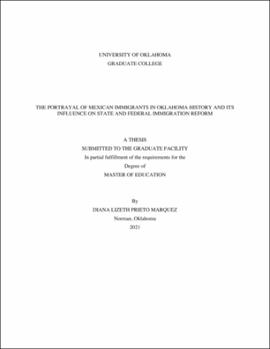| dc.description.abstract | The portrayal of Mexican immigrants in Oklahoma history is damaging to the growth and
prosperity of the Mexican immigrant community because it enforces the stigma and negative
stereotypes this community continues to battle today. This directly affects our current era
because the consistent themes that immigrants are portrayed in ignite anti-immigrant rhetoric in
society and policy work. Access to citizenship is one way that these narratives affect the
population, as it continues to limit their access to resources, and at times portraying them as not
deserving of citizenship and the legal rights, and protections citizenship would extend to the
population. Such actions are enforced by the fear of allowing this community to become a part of
this country because of the stereotypes created about them. Immigration policy cannot improve
and serve all populations equally if the dominant narrative of Mexican immigrants is not
dismantled, challenged, and analyzed. The perceptions of immigrants have been created and
enforced throughout history, carried over time, and are still present in the media today. One such
example is the 2016 election, and the propaganda used to gain public support by Donald Trump,
who ran on the claim that "Mexico sent its "worst elements," including rapists, drug-runners, and
criminals to the U.S., that "tremendous infectious disease" poured across the U.S.-Mexico
border, and that a "beautiful" wall built between Mexico and the U.S. (and paid for by Mexico)
was a necessary solution to the "problem" of immigration."2 It is vital to recognize how history
continues to affect the future of marginalized communities. This research will aim to make that
connection by exploring how negative perceptions of Mexican immigrants are directly connected to immigration reform in Oklahoma. Oklahoma is left out of the conversation on Latina/o/x
history, and I argue it is a much-needed space to interrogate to speak to how populations have
been negatively impacted by master narratives that framed them as outsiders.
Key Words: Immigration Policy, Dominant Narrative, Mexican Immigrants, Oklahoma
History
2 Winders, Jamie. 2016. "Immigration and the 2016 Election." The University of North Carolina
Press (University of North Carolina Press) 56 (3): 291-296.
VIII | en_US |

